10 Marxist Films for Philosophy Students
Marxism has a long history in film, dating back to the earliest days of the Soviet Montage era in the 1920s. However, Marxism covers a broad range of political ideologies and movements. For the sake of expediency, we will focus on Marxist film theory and the principles of Marxist aesthetics when composing this list. But first, let’s address an important question: what are Marxist films?
What is a Marxist Film?
In essence, a Marxist film is simply a film in which Marxist ideas are represented as a vital part of the narrative or visual style. To better understand Marxist films, we must look at the tenets of Marxism. Again, Marxism spans a wide range of philosophies, but Marxist film theory and Marxist aesthetics provide a more focused vision of Marxism in film.
Marxism originated from the writings and teachings of two German philosophers, Karl Marx and Friedrich Engels. As a brief overview, Marx and Engels sought to evaluate society and history through an economic lens. In his seminal work, The Communist Manifesto (1848), Marx defined two distinct classes within society: the bourgeoisie and the proletariat.
Marxist Theory
Marxist political theory views history as a constant struggle between these two classes. The bourgeoisie is the capitalist class that owns the wealth and the means of production. Alternatively, the proletariat is the working class that provides the labor in a capitalist system.
In the ideal Marxist society, the proletariat owns the means of production. Capitalism, which has its roots in the feudal systems of the past, must fall and be replaced with production owned by the producers (workers). Thus, Marx and his contemporaries argue in favor of a Communist political revolution to overthrow the bourgeoisie.
The tenets above only scratch the service of Marxist theory, but they should provide enough of an overview to understand the place of Marxism in film.
Marxist Film Theory and Aesthetics
Marxist film theory is best represented in the works of Sergei Eisenstein and other Soviet filmmakers of the silent film era. Based upon the concept of the dialectic, these filmmakers sought to form a structuralist film theory and method for production. This dialectic consists of two opposing points of view which, when put together, work to form a synthesis (a result that is greater than the sum of its parts). Out of this theory, the Soviet Montage movement was born. Editing became the foundation of structuralist film theory, allowing filmmakers to juxtapose two images, resulting in a synthesis of opposing ideas.
However, Soviet filmmakers were not satisfied with promoting Marxist theory through editing alone. They saw their work as the antithesis to the Classical Hollywood style of narrative that formed in the United States and other western countries in the 1920s and 30s.
In Classical Hollywood Cinema, the story progresses through the actions of a singular protagonist. This focus on the individual stood in stark contrast to the ideals of Marxism. Thus, Soviet filmmakers sought to tell stories in which the collective whole (the proletariat) moved the narrative forward.
This formed the basis of Marxist aesthetics, or the theory that art should represent and promote Marxist theory. Marxist films do not aim to distort reality or the oppression of the working class. Rather, they work to actively show reality, while also promoting ways to improve society. Marx expounded upon the concept of dialectical materialism in his later work, Das Kapital (1867-1883).
Defining Marxist Films
So, now that we have a broad definition of Marxism, it still begs the question: what is a Marxist film? To create a concise list, including only those films that can unequivocally be considered Marxist, the criteria are as follows:
- A Marxist film must work as an antithesis to Classical Hollywood Cinema in either visual or narrative style.
- Marxist films must promote the collective over the individual.
- Marxist cinema must present the struggle between classes and work to heighten class consciousness.
10 Marxist Films for Philosophy Students
This list of Marxist films will work in chronological order. The respective number of each film does not represent the quality or the degree to which the film qualifies as “Marxist.” With this list, I hope to provide viewers with Marxist films from a wide range of countries, directors, and eras. In any case, let’s take a look at 10 Marxist films for philosophy students:
10. Battleship Potemkin (Sergei Eisenstein, 1926)
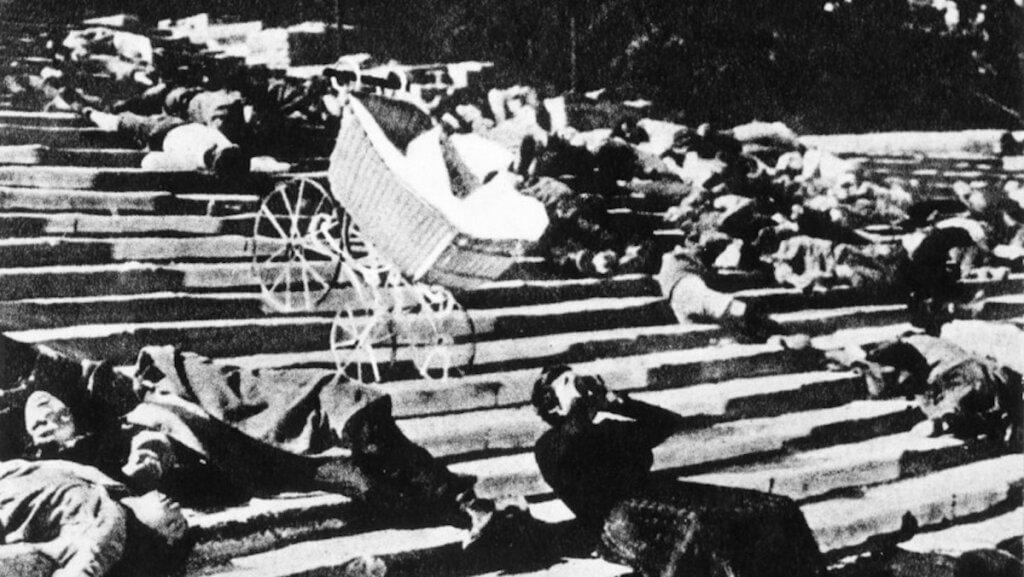
Though we could fill this list with Soviet Montage films (October, Man With a Movie Camera, etc.), Battleship Potemkin is one of the most influential examples of Marxist Cinema from this movement. Set in 1905, the film tells the story of sailors on board the Battleship Potemkin who rise up against the Tsar and his government. The group sets sail for Odessa, where they display one of their dead comrades, convincing the locals to join in their rebellion. In the film’s most famous sequence, Tsarist foot soldiers march down the Odessa Steps, killing civilians as they go. Though Battleship Potemkin shows the brutality of the Tsarist regime, it also shows the capacity for people to rise up in solidarity.
9. Metropolis (Fritz Lang, 1927)
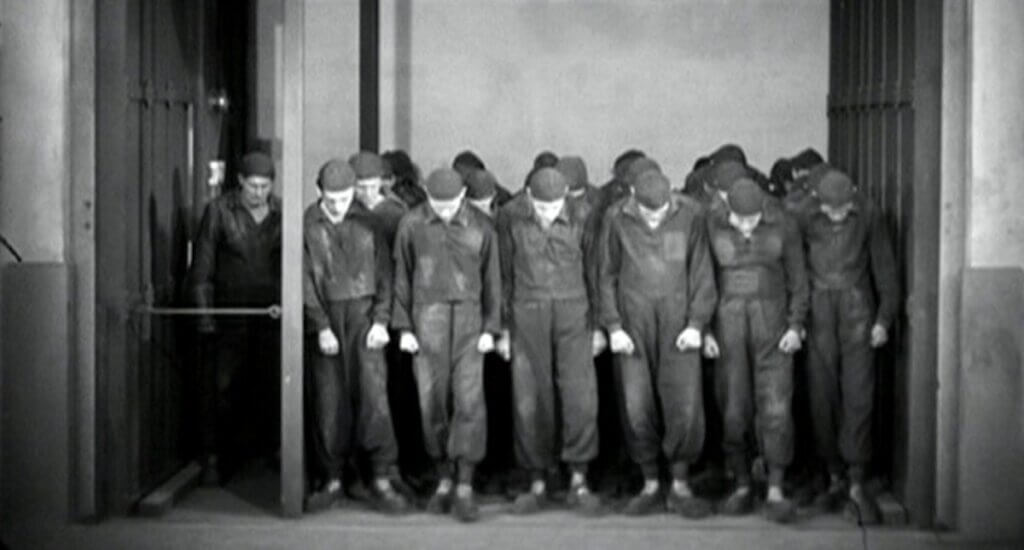
Metropolis is one of the most famous films of German Expressionism, a movement in which inner feelings and emotions were given precedence over realistic depictions. In Metropolis, Fritz Lang creates a futuristic dystopia in which the underground laborers work tirelessly to keep the industrial city of Metropolis running smoothly. When a machine explodes, killing many workers, a plan is hatched to free the workers and close the gap between the proletariat below and the rich industrialists above. Metropolis is also an early example of Postmodernism in cinema.
8. Rome, Open City (Roberto Rossellini, 1946)
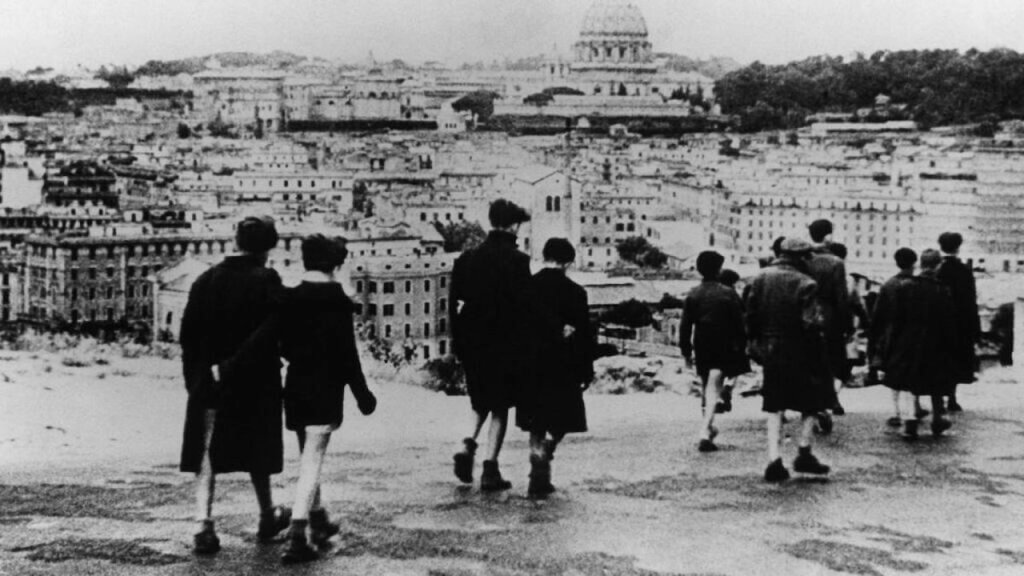
Critics celebrate Rome, Open City as one of the greatest works of the Italian Neorealist movement. Though the story centers on one character, Giorgio, it follows his efforts to collaborate with other Communists and Resistance fighters during Nazi occupation. Like all Italian Neorealist films, Rome, Open City aims to provide a realistic portrayal of working-class people. It also shows the brutality and cruelty of Fascist regimes.
7. La Terra Trema (Luchino Visconti. 1948)
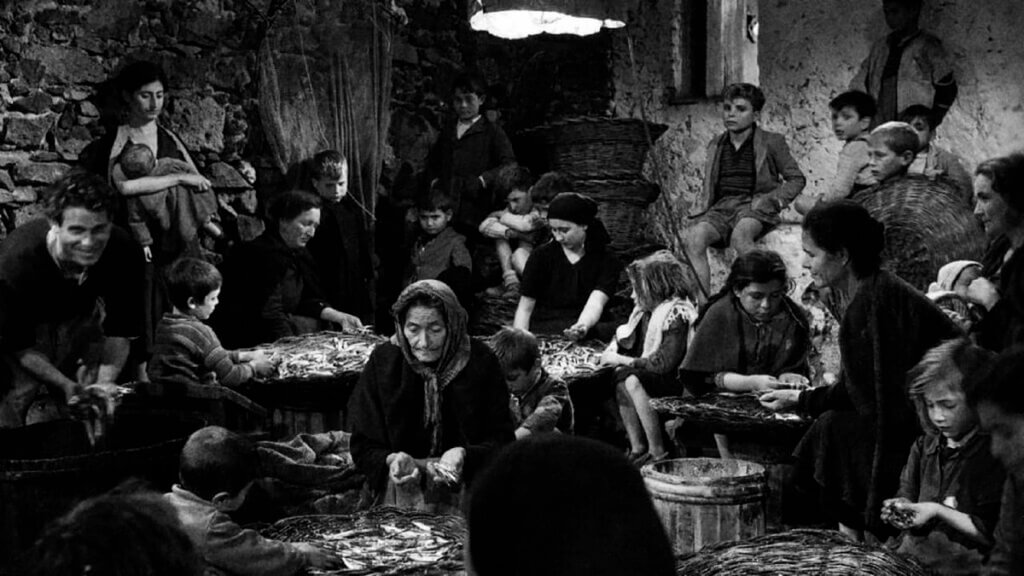
Another classic of Italian Neorealism, La Terra Trema (“The Earth Trembles”), tells the story of a family of fishermen in Sicily. Having been exploited by the local wholesalers for years, the family decides to go into business for themselves. However, tragedy strikes when a storm destroys their boat and their hope for independence. The remainder of the film chronicles their spiral into despair, as they struggle to make ends meet in the face of insurmountable economic forces.
» You Might Like: Trainspotting and the Dilemma of Scottish National Identity
6. Salt of the Earth (Herbert J. Biberman, 1954)
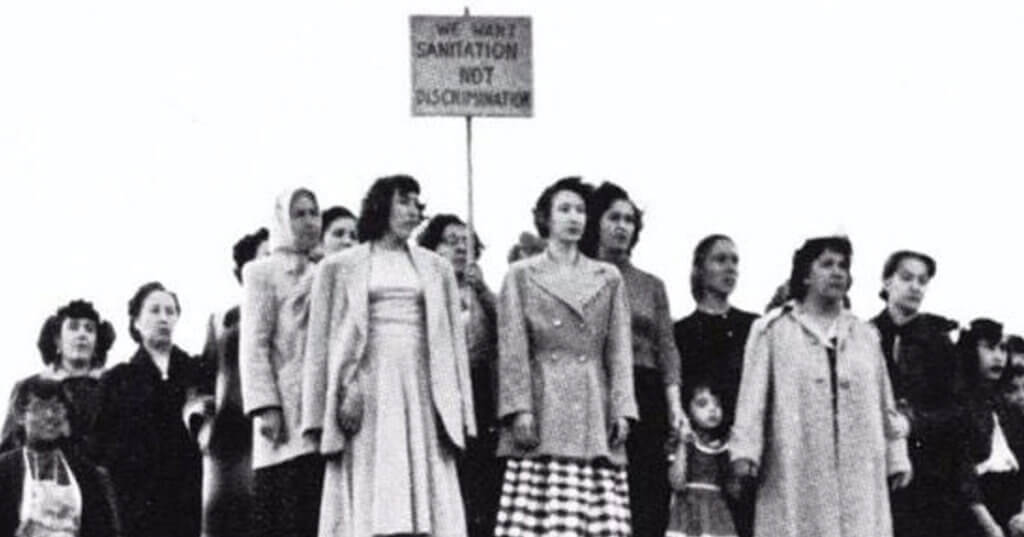
Herbert Biberman’s Salt of the Earth was originally blacklisted by the Hollywood establishment for its promotion of Communist politics. Echoing the style of Italian Neorealism, the film portrays Mexican-American miners striking against the Delaware Zinc Company in New Mexico. The union faces opposition from both the company and the local police. Salt of the Earth is not only one of the few early American films to promotes Marxist concepts, but also one of the first to incorporate feminist film theory.
5. The Battle of Algiers (Gillo Pontecorvo, 1966)

The Battle of Algiers is shot in a pseudo-documentary style, with many non-actors reenacting events from the Algerian War. It tells the story of a group of rebels who rebel against the French government in North Africa. While Pontecorvo remains neutral in his portrayal of both the Algerian rebels and French authorities, The Battle of Algiers highlights the struggle of oppressed groups and accurately depicts guerilla warfare.
4. Weekend (Jean Luc Godard, 1967)
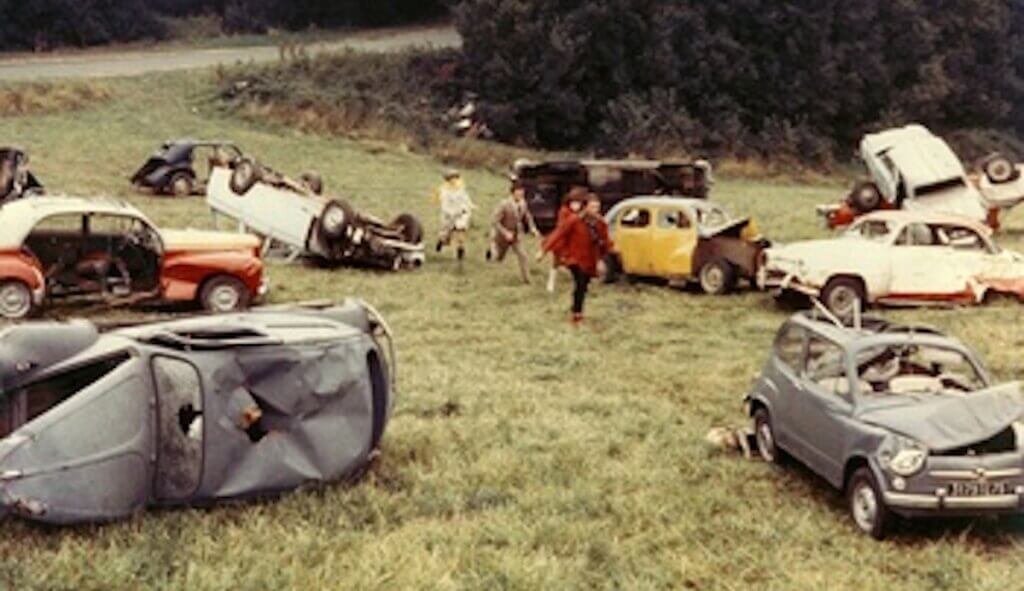
Jean Luc Godard incorporated Marxist film theory in many films spanning several decades, but Weekend exemplifies Marxism in film in both its narrative and visual style. In the film, a borgeous couple, Roland and Corinne, travel to Corinne’s parents’ house to secure her inheritance. They encounter many strange characters and situations along the way. When they are unable to get the funds from Corinne’s mother, they resort to murder, only to be confronted by a cannabalistic group of revolutionaries.
3. Fight Club (David Fincher, 1999)
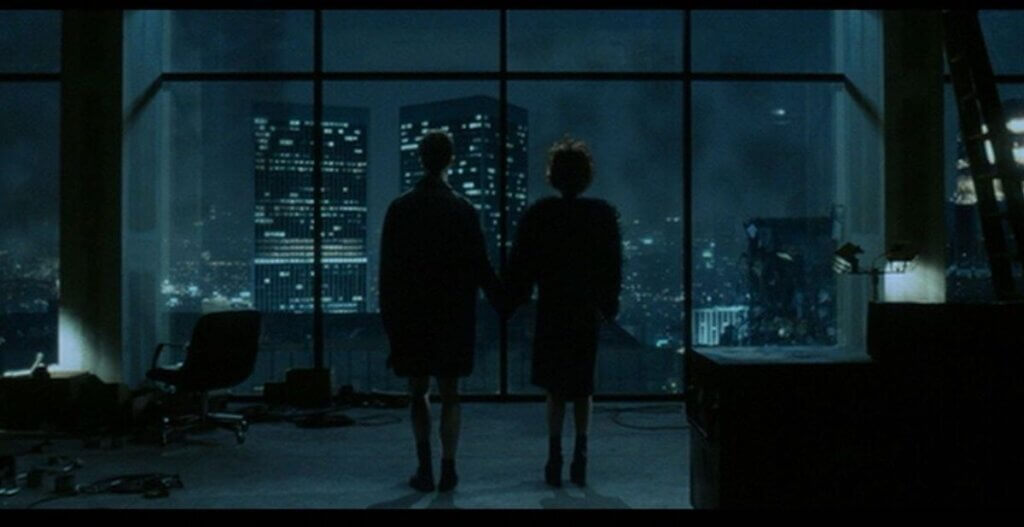
In Fight Club, a white-collar worker decides to form a fight club with his new friend, Tyler Durden. The club quickly grows as Tyler turns the club into an anti-capitalist organization known as Project Mayhem. Subsequently, death and violence ensue as the protagonist struggles to control the organization. The film is often read as a critique of modern capitalism and corporate culture through its narrative and uniquely subversive visual style.
2. House of Pleasures (Bertrand Bonello, 2015)

House of Pleasures (also known as “House of Tolerance” and “L’Apollonide: Souvenirs de la maison close”) chronicles the final days of a Parisian brothel at the turn of the century. The women of the brothel have no other options in life and must continue working to pay off their debts. Meanwhile, the madame struggles to keep the brothel afloat as the landlord increases the rent. The film does not put particular attention on any one character. Instead, it tells the collective story of women forced to give in to the whims of their bourgeois clients.
1. Parasite (Bong Joon-Ho, 2019)

Parasite tells the story of a lower-class family as they slowly infiltrate a bourgeois household. First, the son works for the wealthy family as an English tutor for their daughter. Then, he recommends his own family members to fill different roles within the household. However, as the story progresses, the lower-class family struggles to hide their secret or their contempt for their employers. To add to their troubles, the lower-class family must contend with a housekeeper who doesn’t want to leave her post.
Honorable Mentions:
Marxist Horror Films
Zombies and Capitalism – Night of the Living Dead (George A. Romero, 1968)
The Horror of Capitalism – The Platform (Galder Gztelu-Urrutia, 2019)
Godard Marxism
Marxist Criticism – Tout va bien (Jean Luc Godard, 1972)
Marxist Film Theory – Film Socialisme (Jean-Luc Godard, 2010)
Marxism in Hollywood
Marxism in America – The Front (Woody Allen, 1976)
Corporate Culture – Sorry to Bother You (Boots Riley, 2018)
So there you have it! These are the 10 Marxist films for philosophy students. Naturally, this is not a comprehensive list, so if you think that there are other films that should be included, feel free to leave a comment!
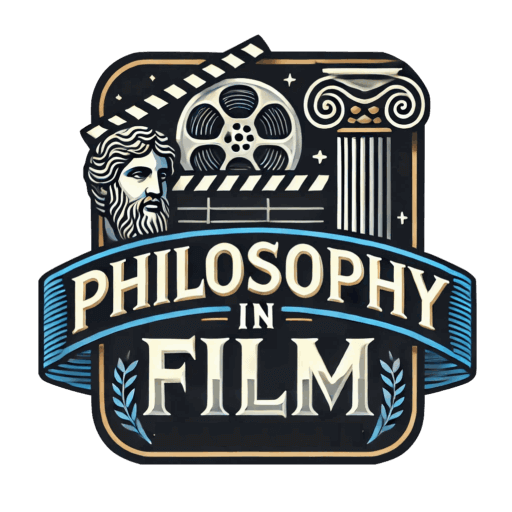

Very nice films…
Les actes de Marusias et la classe ouvrière va au paradis avec pour acteur principal Gian Maria Volonte et on pourrait inclure d’autres films avec lui pourrait être considéré. Il y a 1900 de Bertolucci. Le cinéma italien a fortement contribué dans la production influencé par le marxisme.
Hi Matthew,
very much enjoying these features where you outline a critical framework of analysis and list a few film examples that fit the critique. Nice work!
Very good selection. I would like to add another film by name “”Like the Rest if Us””, a yugoslavian film made un 1990/1991.. Well I don’t remember the director’s name.. the Marxist outlook is obliquely hinted through meaningful camera viewpoints and POVs…
No Fassbinder?
The Niklashausen Journey.
Two More: The North Star, Battle of Nervetna
My favorite Marxist film is Sorry To Bother You.